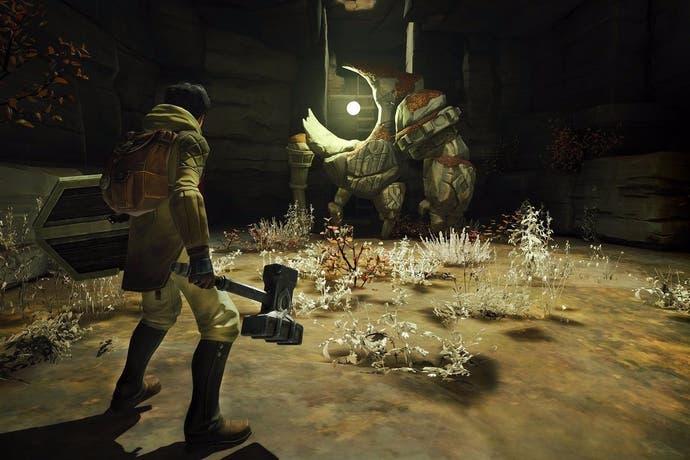Chronos VR: a single-player game that makes you feel like you're two people
Out-of-body XP.
When you set up an Oculus Rift, as I did this morning, with much misplugging of wires and bumping of head on underside of desk, you are greeted with a few vistas to acclimatise you to this brave new world of virtual reality that you are entering. And I mean entering. One of these vistas offers a brooding steampunkish cityscape, with scalpel towers rising into a gloomy sky while luminous airships drift up and down the skyscraper canyons. I was dazzled for a few seconds, and then I realised it was just a nearly-static diorama. If it was the start screen for a new Batman game, say, I would think it was artful and stylish and little more. I might take a screenshot and move on. But then I leaned forward and realised something else: I was sat on the precipice of a thirty-storey drop. I was dazzled all over again: VR has taken a skybox and slotted me right inside it.
This sense of being dazzled by the ostensibly familiar came back when I loaded up Chronos, a game I'd heard quite a bit about, since a lot of people are arguing that it proves that VR can cope pretty well with traditional third-person action games. It can! But in the process, it also makes traditional third-person action games feel freakishly new, at least for the opening hour or so. You know that thing about how people are more likely to be emotionally engaged in movies if they watch them on a plane? The way that the slight vulnerability of separation with the earth makes you laugh harder at The Other Guys or weep more freely during The Unknown Known (just me?). I think there's a little of that going on with VR, that you are predisposed to bedazzlement by a combination of isolation and novelty. But Chronos suggests that there is something more at work too.
On paper, Chronos is fairly standard: it's a fantasy hack and slash in which you move between a gloomy futuristic reality and a rocky, candlelit world of trolls, blacksmiths and dragons, by means of glowing chunks of rune that you encounter as you explore. Combat is Zelda-ish, with light Dark Souls flourishes: there's a lock-on and simple sword combos, but you get a shield, too, which comes with a parry move, and you can upgrade weapons as you progress. There are a handful of systems apparent after an hour or so's play, and some of them are quite neat: every time you die, your character ages by one year, eventually tilting your build away from physical strength to arcane magic (as a 37-year-old, I can confirm the truth in this.) In many ways, though, Chronos is a throwback.
What's really interesting about this game, I would argue, is your relationship to your on-screen avatar, and I don't think that would be the case if I wasn't peering into this world through a headset. Chronos is third-person, but it's not the third-person of Nathan Drake or Zelda, where you're a Steadicam obligingly tracking along behind the hero of the adventure, cresting hills and wading through long grass. It's the third-person of old adventure games: you move slickly from one cinematic perspective to another as your character navigates the simple, beautifully dressed environments. But those cinematic perspectives aren't entirely fixed. You can move your head around to see more of the environment, turning to track your hero's progress as you guide them with the control pad, perhaps, or ignoring them completely to stare at the sky, or over a cliff-edge.
In other words, Chronos implicitly casts you as two people: the hero with a sword who you put through their paces one encounter or simple puzzle at a time, and the person - you, perhaps - viewing them from a distance. It's a fascinating, and slightly creepy relationship. At times, I've lost track of my character entirely as I push them in one direction while I examine the floor textures. At others, I bring them in close to where I am, and they unseeingly stare at me while I study their face. Their face, not mine. There is something a little voyeuristic about Chronos.
This sense of separation is built up in other ways: moving into an elevator or climbing up a ladder are actually prebaked animations, although you might not notice it as you ghost through the control pad movements regardless. Equally, when an elevator door shuts on the hero, you often remain in the empty room for a few seconds before transitioning to the new scene: actor, certainly, but also audience.
Chronos is already good fun, so this patina of playful creepiness is merely an interesting VR distraction, but I suspect somebody at some point is going to make a game that builds on it in unexpected ways. Games have always had a more complex relationship with identity and perhaps even complicity than many other mediums: VR makes this wonderfully, worryingly explicit.


